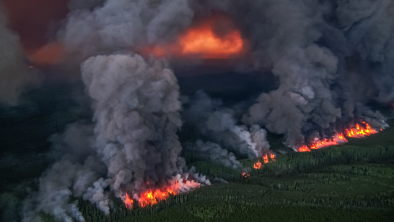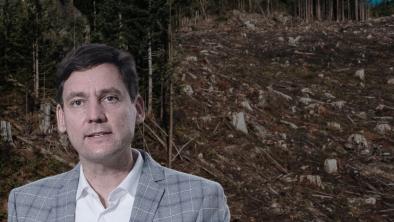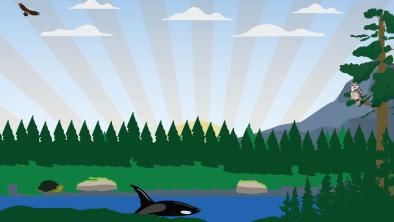Outstanding Clayoquot - Wild Times
Sunday, September 14, 2008

September 15th, 2008 - Read Joe Foy's Wild Times column in the Watershed Sentinel as he looks at what its going to take to save Clayoquot Sound.
By Joe Foy
The black bear was busy with something on the beach, nosing around the tangle of seaweed and shells that formed the high tide mark. I eyeballed the bear for a moment to see if it was interested in me, but aside from a sideways glance every now and then, it generally minded its own business. Overhead an eagle wheeled by, then landed in the top of a big Sitka spruce. The surf kept up that same slow steady beat like I’d heard on wide open Pacific shores from California to Mexico to Hawaii to the Philippines. It was near the end of another near perfect day in outstanding Clayoquot Sound.
Only minutes before, two friends and I had hopped out of a herring skiff to wade ashore at Hesquiat Point, located at the remote north-western edge of Clayoquot. We were there to check out reports of logging road construction that was threatening to breach a pristine old growth valley known as Hesquiat Point Creek.
News of the road building had recently made the front page of the papers. This was a real big deal for a couple of reasons. Since the massive environmental protests in Clayoquot Sound back in 1993 no logging company had logged in any of Clayoquot’s pristine valleys. Not one.
One of the main logging companies in Clayoquot is Iisaak Forest Resources Ltd. It is entirely owned by the First Nations of Clayoquot Sound. Iisaak actually has a written agreement with several environmental groups that the company will not log in Clayoquot Sound’s pristine valleys, and for a decade and a half that promise has been kept.
Which brings us to the second reason that the new logging road construction was such a big deal. Recently a second company was created in Clayoquot Sound, known as Mamook/Coulson. This company is a partnership between a Port Alberni based logging company and the First Nations of Clayoquot Sound. It was Mamook/Coulson who had begun to fall trees in a line aimed at Hesquiat Point Creek, in preparation for building a logging road.
The Friends of Clayoquot Sound quickly informed their allies, including Greenpeace, Forest Ethics, Sierra Club and the Wilderness Committee. A joint phone call was put into Mamook/Coulson explaining the consequences of sparking another war in the woods – and the tree falling was temporarily halted. As I write this Wild Times report, an uneasy truce holds in Clayoquot Sound, while the enviro groups await a face to face meeting with the Chiefs.
While it is easy to see the threats in this surprising turn of events – after all if Hesquiat Point Creek falls to the chainsaw, what hope do the other pristine valleys of Clayoquot have? It is also possible to see the opportunities.
A lot has changed since the protests back in ’93. Recent land use decisions in the Great Bear Rainforest, located on the mainland coast north of Vancouver Island, have worked to strengthen First Nations governance over their territories, protect pristine areas, and bring much needed investment and economic development dollars into First Nations communities.
The ingredients of such a solution are:
1. First Nations cooperative land use planning; and
2. BC government involvement in brokering an agreement and investing in community development. Such government investment can actually attract other conservation minded investment as well.
The good news is that in the southeast portion of Clayoquot Sound at least, the First Nations cooperative land use planning has already begun. The Tla-o-qui-aht First Nation have been collecting information from their members and non-Native neighbours to put together a proposal that provides for economic development while protecting pristine areas in a huge swath of their territory.
But so far the provincial government has not stepped up to provide the support or investment that a solution would require.
Back at Hesquiat Point Creek my friends and I hiked up to where a line of ancient forest had been laid low. It was a sad sight, and a stark reminder that the Clayoquot Sound issue is still outstanding. How about it Mr. Premier?
Joe Foy is Campaign Director for the Wilderness Committee, Canada’s largest citizen-funded membership-based wilderness preservation organization, which has 28,000 members from
coast to coast.


